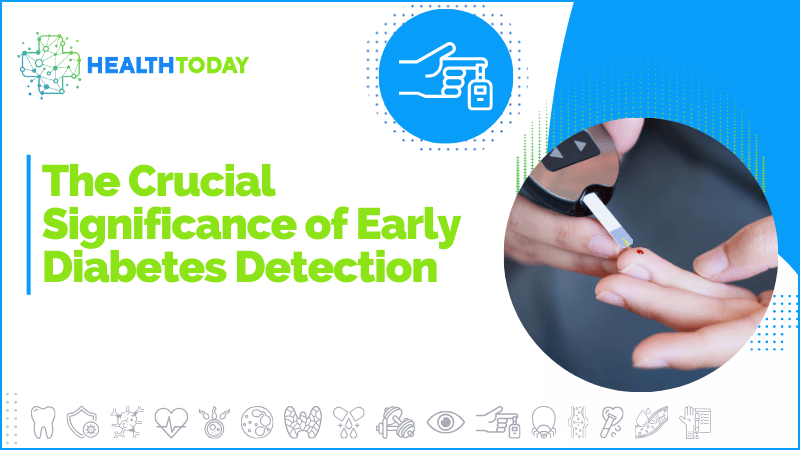
Early diabetes detection is imperative to reduce complications, empower individuals, and alleviate the burden on healthcare systems. Recognizing its potential to prevent cardiovascular issues, kidney dysfunction, and nerve damage, timely intervention through lifestyle adjustments and monitoring is essential. Equally crucial is its role in encouraging healthier choices and preventing prediabetes progression. Beyond clinical impact, early detection promotes patient education, fostering awareness and informed decision-making. By intercepting diabetes at its onset, we can reshape its trajectory, transforming adversity into resilience and improving overall quality of life. Embracing this imperative safeguards well-being and bolsters a culture of proactive health management.
Diabetes, a chronic metabolic disorder affecting millions worldwide, has gained notoriety as a silent epidemic. As its prevalence continues to surge, the importance of early detection cannot be overstated. Timely identification of diabetes or its precursor stages is a powerful tool in mitigating its devastating impact on individuals and healthcare systems alike. This article delves into the imperative of early diabetes detection, highlighting its potential to transform lives, reduce complications, and curb the escalating burden of this disease.
Early detection of diabetes is not merely an option; it is a necessity that holds the key to a healthier future for individuals and societies at large. Through proactive screening and intervention, we can alter the trajectory of this disease and enhance the quality of life for those affected.
One of the most compelling reasons to emphasize early diabetes detection is the potential to prevent complications. Diabetes, when left unchecked, can lead to a litany of health problems, including cardiovascular disease, kidney dysfunction, nerve damage, and even blindness. However, identifying the disease in its nascent stages enables healthcare providers to implement intervention strategies promptly. Early detection allows for effective blood sugar management through lifestyle modifications, medication, and close monitoring. By keeping blood glucose levels in a healthy range, individuals can significantly reduce their risk of developing debilitating complications that arise from uncontrolled diabetes.
Early detection equips individuals with the knowledge and motivation needed to adopt healthier lifestyles. When people are aware of their diabetes risk early on, they are more likely to make meaningful changes to their dietary habits, physical activity routines, and overall wellness practices. Recognizing the potential repercussions of diabetes provides a compelling incentive for individuals to take charge of their health and make positive choices. This not only helps manage diabetes but can also prevent its onset in individuals with prediabetes. Early detection empowers individuals to embrace a proactive role in their health, leading to better outcomes and improved long-term well-being.
Beyond its clinical implications, early diabetes detection plays a crucial role in raising awareness and educating the public about the disease. When individuals are diagnosed in the early stages, it provides an opportunity for healthcare professionals to engage in meaningful conversations about diabetes prevention and management. The knowledge gained through early detection fosters a greater understanding of diabetes risk factors, symptoms, and available interventions. This, in turn, ripples through families and communities, promoting a culture of health-consciousness and informed decision-making.
In conclusion, the importance of early diabetes detection cannot be overstated. It is a vital tool in the fight against this pervasive disease, with far-reaching implications for individuals and societies alike. By identifying diabetes or prediabetes in their incipient stages, we can pave the way for proactive interventions that prevent complications, empower individuals to make healthier choices, and raise awareness about diabetes prevention. Early detection is a powerful weapon in our arsenal, enabling us to shift the trajectory of diabetes from a path of suffering and adversity to one of resilience, empowerment, and improved quality of life. As we continue to battle the diabetes epidemic, let us recognize the transformative potential of early detection and its ability to shape a healthier future for all.
Written on behalf of Health Today.
Those with risk factors like family history, obesity, or symptoms such as increased thirst or frequent urination should consider screening.
Yes, intervening early with lifestyle changes can prevent or delay the onset of diabetes, especially in cases of prediabetes.
Adults should consider screening every 3 years from age 45, adjusted based on risk factors. Pregnant women are screened for gestational diabetes at weeks 24-28 of pregnancy. Always consult healthcare professionals for personalized advice.